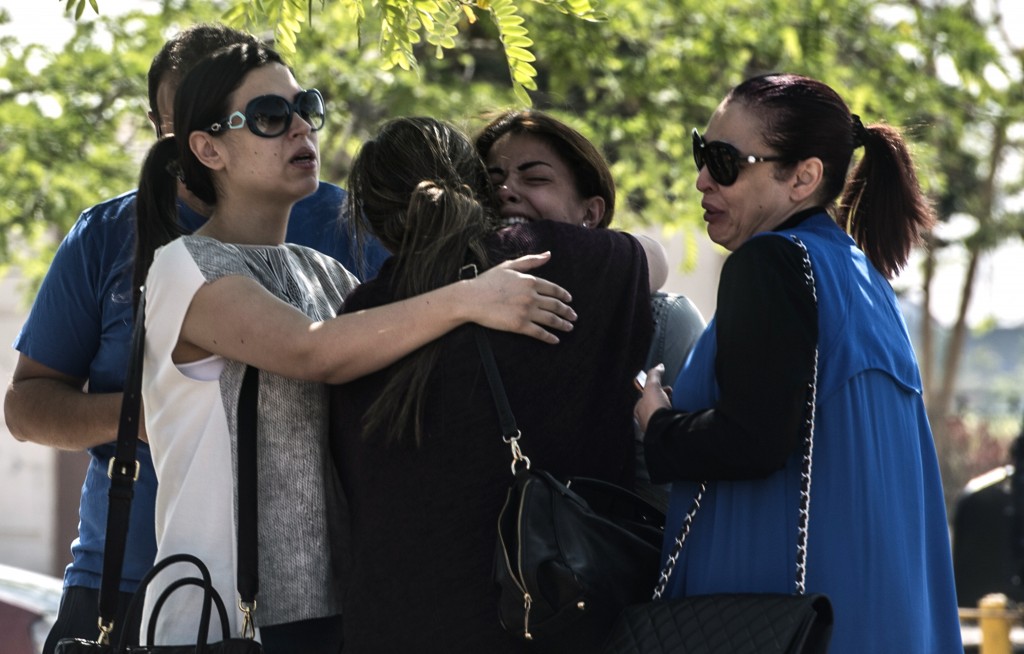
The EgyptAir flight that vanished over the Mediterranean was carrying 30 Egyptian and 15 French passengers, as well as a Briton and a Canadian, the airline said. / AFP PHOTO /
by Juliette MICHEL Tangi QUEMENER
PARIS , France (AFP) — Several scenarios could explain the mysterious disappearance of the Egyptair flight between Paris to Cairo early Thursday, but experts say a terrorist attack is the most likely.
Both France and Egypt have been leading targets for Islamist extremists in recent months.
In October, the Islamic State group claimed responsibility for bombing an A321 plane belonging to Russian charter company Metrojet that crashed into the Sinai desert on its way from the Egyptian resort of Sharm el-Sheikh to St Petersburg, killing 224 passengers and crew.
Experts say the chances of a mechanical malfunction in the case of Thursday’s Egyptair disappearance are slim.
“A major technical fault — the explosion of a motor, for instance — seems improbable,” said aeronautics expert Gerard Feldzer, underlining that the A320 in question was “relatively new”, having entered service in 2003.
In addition, the A320 has an excellent safety record as the best-selling, medium-range airliner in the world. An A320 takes off or lands every 30 seconds around the world, Feldzer said.
“It’s a modern plane, the incident happened in mid-flight in extremely stable conditions. The quality of the maintenance and the quality of the plane are not in question in this incident,” Jean-Paul Troadec, former director of France’s aviation Bureau of Investigation and Analysis, told Europe 1 radio.
Egyptair “is a company with authorization to operate in Europe, so it is not on any blacklist,” he added.
Experts also say it is unlikely that the plane was shot down from the ground, as was the case with the Malaysia Airlines Flight 17 that went down over Ukraine in July 2014, or from the sea as occurred in July 1988 when the US Navy blew up an Iran Air passenger flight by mistake.
The Egyptair plane was flying at 37,000 feet (11,000 meters) and disappeared about 130 nautical miles off the Greek island of Karpathos.
That would put it out of reach of portable rocket launchers used by several militant groups in the Middle East.
“We cannot exclude the possibility that it was shot down by another aircraft by mistake, but it is likely we would already know,” said Feldzer.
The region around northern Egypt, including the Israeli and Gazan coastlines, is “one of the most monitored regions in the world, including by satellite. It would be very difficult to hide this kind of information,” he added.
No distress signal
That leaves a terrorist attack as the most likely possibility, not least because it appears that no distress signal was sent from the aircraft.
“A technical problem, a fire or a motor malfunction, doesn’t cause an instantaneous accident and the crew has time to react,” said Troadec.
“Here, the crew didn’t say anything.”
If a bombing is established, the question for investigators will be how a device was smuggled aboard a flight taking off from France’s busiest airport, Paris Charles de Gaulle, where security has been on high alert since last year’s jihadist attacks in the French capital.
“A bomb placed on board at Roissy or in Cairo is always possible because it’s difficult to make your airport 100 percent watertight, even in an airport with such tight surveillance as Roissy (Charles de Gaulle),” said Feldzer.
“The first thing to do is to recover debris that will give us some indications on the accident… to see if there are any traces of explosives.”
tq-jum/er/gj
© 1994-2016 Agence France-Presse








